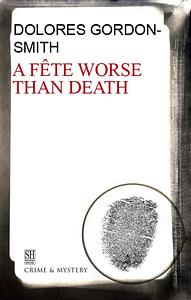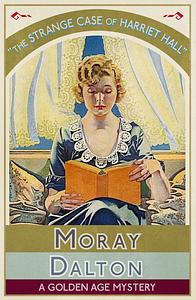Take a photo of a barcode or cover
robinwalter's Reviews (1.87k)
lighthearted
relaxing
fast-paced
Plot or Character Driven:
Character
Strong character development:
Yes
Loveable characters:
Yes
Diverse cast of characters:
No
Flaws of characters a main focus:
N/A
emotional
hopeful
lighthearted
medium-paced
Plot or Character Driven:
Character
Strong character development:
Yes
Loveable characters:
Complicated
Diverse cast of characters:
No
Flaws of characters a main focus:
N/A
The ML is a bit too 'won't take no for an answer' in the early stages for me.
lighthearted
mysterious
medium-paced
Plot or Character Driven:
Plot
Strong character development:
N/A
Loveable characters:
No
Diverse cast of characters:
No
Flaws of characters a main focus:
N/A
An interesting start to the series. The author has nailed the period style very well. I found the period-appropriate racial slurs troubling, and the key evidence was in a lengthy passage about WWI which I kind of glazed over. Several of the key elements of the story were rather obvious, although I didn't put them together to actually work out the killer until there was no one else left it could be. The book did enough to ensure I check out the next in the series
informative
medium-paced
This book would have scored 4.5 or 4.75 if only it had cut to the chase sooner. It was longer than it needed to be to cover the advertised theme because the author got bogged down in the beginning providing a plethora of largely superfluous details about Napoleon's Egyptian campaign. Had the book started with "Napoleon's force discovered the Rosetta Stone" and carried on from there, it would have been an absolute ripper.
Once it DID get to the chase, the book soared. The wealth of information was fascinating, the analogies and comparison helpful and often amusing, as in this favourite explaining how we subconsciously use context to aid in processing spoken speech:
Once it DID get to the chase, the book soared. The wealth of information was fascinating, the analogies and comparison helpful and often amusing, as in this favourite explaining how we subconsciously use context to aid in processing spoken speech:
Primed by thoughts of tangerine trees and marmalade skies, we hear a girl with kaleidoscope eyes and not a girl with colitis goes by
Extra marks for the clear-eyed candour about the gap between the mythologised splendor of Ancient Egypt and its much more brutal and humdrum reality. The abundance of caveats throughout the book were welcome signs of the author's intent to present "just the facts", and that he did so in an informative and and at times entertaining manner is to his credit.
dark
emotional
tense
medium-paced
Plot or Character Driven:
A mix
Strong character development:
No
Loveable characters:
No
Diverse cast of characters:
Complicated
Flaws of characters a main focus:
Yes
This book is the first for which I have felt compelled to leave a content warning on Storygraph. Reading it was an unpleasant and painful experience.
The most disturbing part of this book for me was its heavy reliance on vicious cruelty toward children, or rather a child, as an integral plot device. The child in question is physically tortured on more than one occasion, subject to extreme emotional stress and repeatedly targeted as the perpetrator or accomplice in serious crimes by senior police officers. In all of the instances where the child suffers physical violence, that violence was passively facilitated by his own mother, and in no instance does she show any real awareness of the depth and intensity of the emotional and psychological trauma her son endured.
This fixation throughout the story on harming a specific child was the primary reason I found it difficult to finish. Another repellent feature was the sheer stupidity of the child's mother in allowing her son to be abused.
In one instance she almost physically forced him against his will into the company of people who subsequently tortured him, on another she left him alone in the house overnight which enabled a different set of torturers to inflict pain and injury. I can only hope that Moray Dalton took better care of her own child than her character did here. It may be a reflection of my own modern sensitivities, but the fact that, with the exception of Collier, no one cared about the extreme nature of the physical and emotional violence directed at this child left me flabbergasted.
As for the actual murders themselves, the way the Chief Constable and his senior officer targeted a 12-year-old child as a likely murderer in two different murders was not only bizarrely implausible given the facts of the two crimes, but a little worrying coming after "Harriet Hall". in that story, Collier has to deal with an inimical Chief Constable who called him in reluctantly, viewed him with suspicion and overrode his authority on several instances. In this story, all of the above is true, with the added elements that the said Chief Constable and his assistant are maliciously stupid. I’m hoping that Dalton doesn’t return to this particular trope too often in future stories.
The resolution of the multiple murders is interesting. It was particularly interesting that in the case of one of the murders it was solved for Collier completely by accident when he happened to be present as an unexpected witness gave testimony. Collier’s own police work was central to the solution of the other murders in the story.
In summary, this was a very dark story indeed. It was full of anger futilty and bitterness. The bitterness and futility even extend to the ultimate resolution, and taint Collier’s usually sunny disposition. The sentiments about the viciousness, futility and stupidity of war are sentiments I wholeheartedly endorse. That Dalton chose to express that bitterness and spleen by making a child the repeated victim of viciousness and stupidity is not something I can endorse.
In his introduction Curtis Evans says that the child in question and his mother feature again in a later Collier story, and having finished this book I am disappointed by that, because I would not want to ‘meet’ the poor child’s mother ever again.
Moderate: Child abuse, Torture
A child in this story is repeatedly tortured. He is also seriously bullied, including by police officers
dark
mysterious
tense
medium-paced
Plot or Character Driven:
Plot
Strong character development:
N/A
Loveable characters:
No
Diverse cast of characters:
No
Flaws of characters a main focus:
Yes
A fascinating addition to the Collier series. Already one of my favourite Golden Age detectives, the stoic Collier was positively (and in the end aptly?) Zen in this one, at least in his dealings with his superiors. I read this just after Brian Flynn's "The Spiked Lion", and the contrast was marked. Flynn's book suffered from the fact that its whole plot would be undone quickly and easily by modern science now accessible to the general public. That's not Flynn's fault, of course, but it did make it hard to invest in the story.
This story on the other hand, was much less dated. Its central conceit deals with a major part of the human experience that has similarly seen big changes in recent years, but because the changes are cultural/perceptual and psychological, they don't affect the relevance of the plot device in this story.
Apart from the relative rarity of that central plot point, the other thing that made this book fun to read was the surprisingly open hostility of the Chief Constable who had summoned Collier Their interactions were among the most interesting for me.
The way Collier deduced who was responsible for the murders was solid, and his discreetly ambiguous revelation toward the end was so nicely done, and so deftly imprecise, that I nearly gave this 4.75/5. Unfortunately, the epilogue made the implicit explicit, and that spoiled the effect a bit for me, so I give it 4.5/5
This story on the other hand, was much less dated. Its central conceit deals with a major part of the human experience that has similarly seen big changes in recent years, but because the changes are cultural/perceptual and psychological, they don't affect the relevance of the plot device in this story.
Apart from the relative rarity of that central plot point, the other thing that made this book fun to read was the surprisingly open hostility of the Chief Constable who had summoned Collier Their interactions were among the most interesting for me.
The way Collier deduced who was responsible for the murders was solid, and his discreetly ambiguous revelation toward the end was so nicely done, and so deftly imprecise, that I nearly gave this 4.75/5. Unfortunately, the epilogue made the implicit explicit, and that spoiled the effect a bit for me, so I give it 4.5/5
THe resolution of the series mystery was well done, but the 'hero' remained a controlling jerk to (almost) the end, so I DNFd
The writing style and content just did not gel with me
mysterious
relaxing
medium-paced
Plot or Character Driven:
Plot
Strong character development:
No
Loveable characters:
No
Diverse cast of characters:
No
Flaws of characters a main focus:
No
A very elaborately structure plot, but unfortunately, it was also extremely transparent, and the fact that the entire plot would not be possible today made finishing the story hard work
informative
reflective
medium-paced
Plot or Character Driven:
Character
Strong character development:
Complicated
Loveable characters:
Complicated
Diverse cast of characters:
Yes
Flaws of characters a main focus:
Yes









